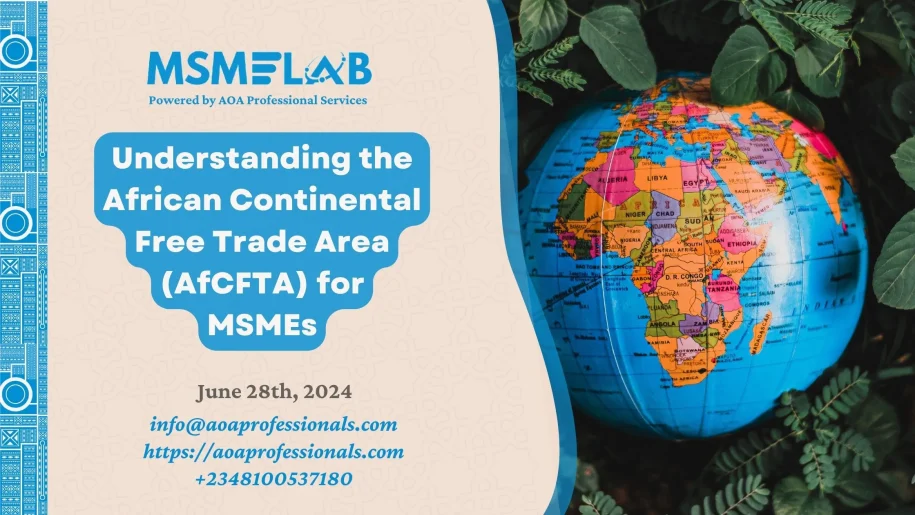As a seasoned professional with over 20 years of experience, I’ve witnessed the dynamic evolution of trade policies and their profound impact on businesses, particularly Micro, Small, and Medium Enterprises (MSMEs). The African Continental Free Trade Area (AfCFTA) represents one of the most transformative economic initiatives aimed at reshaping the business landscape across Africa. This article delves into the opportunities and challenges presented by AfCFTA, particularly for MSMEs, and includes relevant case studies to illustrate its practical implications.
Overview of AfCFTA
Launched on January 1, 2021, AfCFTA aims to create a single market for goods and services, facilitating the movement of capital and people. With 54 of the 55 African Union nations signed up, it stands as the largest free trade area globally by the number of participating countries. The primary goals of AfCFTA include boosting intra-African trade, reducing tariffs on 90% of goods, and addressing non-tariff barriers.
Opportunities for MSMEs
- Market Expansion: AfCFTA opens up a market of over 1.3 billion people with a combined GDP of $3.4 trillion. MSMEs can leverage this expansive market to scale their operations, diversify their customer base, and increase revenue.
- Cost Reduction: By eliminating tariffs on most goods, AfCFTA reduces the cost of importing raw materials and exporting finished products. This cost efficiency can significantly enhance the competitiveness of MSMEs.
- Enhanced Competitiveness: The exposure to a larger market compels MSMEs to improve product quality and innovation to meet diverse customer preferences, fostering a culture of continuous improvement.
- Access to Finance: With increased market opportunities, financial institutions are more likely to provide funding to MSMEs, recognizing their potential for growth and profitability under AfCFTA. Challenges for MSMEs
- Regulatory Compliance: Navigating different regulatory frameworks across member countries can be daunting. MSMEs must stay informed about varying standards and regulations to ensure compliance.
- Infrastructure Deficits: Inadequate infrastructure, such as poor road networks and limited access to electricity, can hinder the seamless movement of goods and services, affecting MSME operations.
- Technical Know-How: MSMEs often lack the technical expertise required to optimize cross-border trade. Investing in training and capacity-building initiatives is essential for maximizing AfCFTA benefits.
- Competition: The removal of trade barriers increases competition from larger enterprises and foreign companies. MSMEs need to innovate and enhance their value proposition to remain competitive.
Case Studies
Case Study 1: Agritech Solutions Ltd.
Agritech Solutions Ltd., a small agricultural technology firm based in Nigeria, leveraged AfCFTA to expand its market reach across West Africa. By eliminating tariffs, the company could export its innovative irrigation systems to Ghana and Côte d’Ivoire at a lower cost. This expansion not only increased its revenue by 40% but also fostered partnerships with local distributors, enhancing its market presence.
Case Study 2: Fashion House Africa
Fashion House Africa, an MSME in Kenya, designs and manufactures bespoke clothing. With AfCFTA’s implementation, the company started sourcing high-quality fabrics from Egypt and exporting finished garments to South Africa. The reduced tariffs and streamlined customs procedures facilitated a 30% reduction in production costs and a 25% increase in sales. The company also benefited from networking opportunities at AfCFTA business forums, leading to collaborations with designers across the continent.
Conclusion
AfCFTA presents a paradigm shift in how African MSMEs operate, offering unprecedented opportunities for growth, market expansion, and innovation. However, the journey is not without challenges. By strategically navigating regulatory landscapes, investing in capacity building, and embracing technological advancements, MSMEs can harness the full potential of AfCFTA. As an experienced professional, I advocate for proactive engagement with AfCFTA’s frameworks and resources to ensure that MSMEs not only survive but thrive in this new era of African trade integration.
Recommendations
- Capacity Building: Governments and private sector organizations should invest in training programs to equip MSMEs with the skills needed to navigate the AfCFTA landscape effectively.
- Infrastructure Development: There is a critical need for improved infrastructure to support the efficient movement of goods and services across borders.
- Information Dissemination: Regular updates and clear communication about regulatory changes and trade opportunities under AfCFTA can help MSMEs stay informed and compliant.
- Financial Support: Enhanced access to finance for MSMEs can drive innovation and growth, enabling them to capitalize on the opportunities presented by AfCFTA.
By addressing these areas, MSMEs can be better positioned to contribute to and benefit from Africa’s ambitious free trade agenda.


Leave a Reply